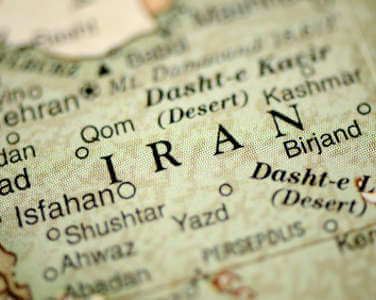
being tortured in prison and threatened with execution, sources close to the
case said.
State Security agents on Feb. 2 arrested the Rev. Wilson Issavi, 65, shortly after he
finished a house meeting at a friend’s home
in Isfahan, located 208 miles south of
Tehran. His church, The
Evangelical Church of Kermanshah in Isfahan, is a 50-year-old church body
affiliated with the Assemblies of God that caters to the local Assyrian
population.
According to Farsi
Christian News Network, Issavi’s wife, Medline Nazanin, recently visited her
husband in prison, where she saw that he had obvious signs of torture and was in poor condition. Iranian
intelligence officials told Nazanin that her husband might be executed for his
alleged activities.
During the
raid, State Security police detained everyone in the
house, later releasing all but Issavi and the owner of the home. Security
officials also seized personal property from the home. Typically in Christian
arrests in Iran, security officials confiscate all documents, media materials,
computers, and personal documentation.
Issavi is
being held in an unmarked prison, according to FCNN.
Last
month’s arrest seems to be part of an anti-Christian sweep that is taking place
across Isfahan. In addition to the politically motivated detentions and
executions that have taken place after June’s contested election and subsequent
nation-wide political protests, it appears authorities are rounding up Christian
leaders.
More
Arrests
On Feb. 28, Isfahan
residents Hamid Shafiee and his wife Reyhaneh Aghajary, both converts from Islam
and house church leaders, were arrested at their home.
Aghajary
was at home with a group of other Christians when police came for her and her
husband, who was not at home, according to Middle East Concern, a group that
assists persecuted Christians. Police handcuffed Aghajary and, upon finding
boxes of Bibles, began beating her.
The
assault continued until eventually Aghajary was pepper-sprayed and removed from
the scene. Her husband Shafiee was arrested an hour later when he returned to
the house.
Their
fate and whereabouts are still unknown.
Authorities assaulted another Christian visiting the house at the
time of the raid when he protested the police action. Other Christians at the
house were threatened, but no one else was arrested. Approximately 20 police
officers raided the home, seizing Bibles, CDs, photographs, computers,
telephones, personal items and other literature.
One
regional analyst, who spoke on the condition of anonymity, said the Iranian
government is set on crushing religious freedom within the
country.
“The
recent spate of church leader arrests provides clear evidence of the Iranian
authorities’ desperate determination to strangle the growing church movement,
along with all other forms of perceived political dissent,” he
said.
February’s arrest was not the first time Shafiee has had run-ins
with Iranian authorities. He has routinely been ordered to appear before police
for questioning and then released. This arrest, however, was different. When
family members contacted police on March 1, they were told that the couple’s
case was under the jurisdiction of the Revolutionary Court and were turned away
with no other information.
While the
couple is imprisoned, family members are caring for their two teenage
boys.
Frequent
Harassment
Like Shafiee, Issavi has
been harassed frequently by the Isfahan branch of the State Security police. He
has been ordered to appear before the police many times, then arrested and
interrogated. In addition, police have threatened members of his family and have
broken into his house and taken items such as his computer.
On Jan. 2, 2010, police
sealed the Kermanshah church and ordered Issavi not to reopen it. The church continued to
have house meetings, and authorities charged Issavi with not cooperating with
the government.
The Assyrians were one of
the first ethnic groups in the Middle East to adopt Christianity. The existence
of the Assyrian Christian community in Iran predates the existence of their
Islamic counterparts by several hundred years. There are 10,000 to 20,000
Assyrian Christians living in Iran, according to unofficial estimates cited in
the 2009 International Religious
Freedom Report issued by the
U.S. Department of State. The total Christian population is 300,000 nationwide,
according to the United Nations. Most of those Christians are ethnic Armenians.
Isfahan
has been the site of some of the worst religious persecution in Iran. On July
30, 2008, Abbas Amiri, a Christian man in his 60s, died in a hospital after
being beaten by Isfahan security police. Authorities had arrested Amiri along
with seven other men, six women and two minors during a July 17 raid on a house
meeting. Four days after her husband died, Sakineh Rahnama succumbed to her
injuries and a stress-related heart attack. Later, officials wouldn’t allow
local Christians to hold a memorial service.
Iran,
where Shia Islam is the official state religion, is known to be one of the worst
countries for repression against Christians. The U.S. Secretary of State has
designated Iran as a Country of Particular Concern every year since 1999 for its
persecution of non-Shia Muslims, among others.
Last year, according to
the International Religious
Freedom Report,
persecution of Christians and other religious minorities continued to get
“significantly worse.” The state department placed the blame for this squarely
at the feet of President Mahmoud Ahmadinejad and Iran’s conservative media, who
“intensified a campaign against non-Muslim religious minorities, and political
and religious leaders” by issuing a continual stream of inflammatory
statements.
“Christians, particularly
evangelicals, continued to be subject to harassment and close surveillance,” the
report states. “The government vigilantly enforced its prohibition on
proselytizing by closely monitoring the activities of evangelical Christians,
discouraging Muslims from entering church premises, closing churches, and
arresting Christian converts.”
Evangelical Christians were required to carry church membership
cards and provide photocopies to authorities, according to the report.
“Worshippers were subject to identity checks by authorities posted
outside congregation centers,” it states. “The Government restricted meetings
for evangelical services to Sundays, and church officials were ordered to inform
the Ministry of Information and Islamic Guidance before admitting new members.”












